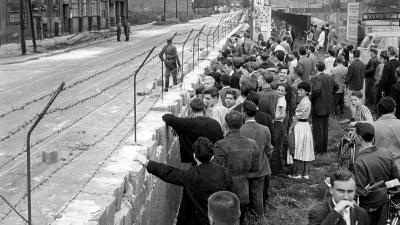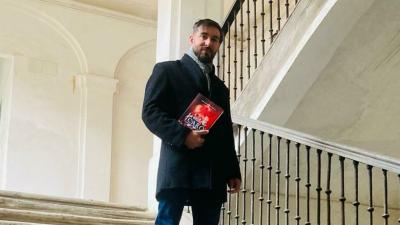The Berlin Wall fell, but the world is once again divided by an invisible wall. The West that faced the Cold War and bloc politics was stronger than the West we live in today, with disastrous policies and a complete lack of faith in ourselves, but still no one jumps over the wall to the other side.
A few days ago in Madrid, I enjoyed the exhibition, “The Berlin Wall. A divided world”, which shows the best example of the conflict between capitalism and communism: the wall of shame that divided the German capital for almost thirty years. Among the exhibits, the propaganda of both sides was particularly striking, especially with regard to the new city that was to be built on the ruins of Berlin. However, the grand plans for a socialist model city turned out to be guard posts, watchtowers and barbed wire. The wall became the most accurate representation of what the socialist paradise was: a gigantic prison. It bears repeating, as history is less and less known, that the wall was built to prevent those who enjoyed the dictatorship of the proletariat from escaping to the decadent West. It was not the other way round. The construction of the wall in 1961 was a realisation of the failure of the communist model. One hundred and forty people died trying to cross it.
The exhibition also looks at the pacifist movements that were born as a response to the nuclear race and the confrontation between blocs. At this point it is important to note that some of these “pacifists” were in fact run, either in the pay of or as “useful fools” in the service of the Eastern secret services. The Greens, for example, were successfully infiltrated by the East German secret police (Stasi). About twenty members of the Green party worked for the Stasi, the most well-known being Dirk Schneider, spokesman for domestic policy. The current German chancellor, Olaf Scholz, was one of the leaders of the Social Democratic Party’s (SPD) Socialist Youth (JUSO) who met with representatives of the Communist Youth of the GDR and the Soviet Komsomol in March 1983 at a JUSO congress at which the United States was condemned as responsible for “the very dangerous escalation of the international situation”. In September of the same year, Scholz attended an “International Youth Camp” in East Germany, which was held under the slogan “Peace is our first human right! Europe must not become Euroshima”. Another prominent socialist, Gerhard Schröder, who served as chancellor from 1998 to 2005, also maintained close relations with the Eastern “comrades”, including with Egon Krenz, the last GDR president, who described the fall of the Berlin Wall as the “worst night of his life”. Schröder maintained good relations with the Kremlin, and after leaving politics he was chairman of Nord Stream, director of the supervisory board of the Russian state oil company Rosneft, and was even offered a seat on the board of the Russian state gas company Gazprom, which he had to turn down because of the invasion of Ukraine. Good relations with Moscow continued under Angela Merkel’s CDU government, and neither the annexation of Crimea nor the war in the Donbas cancelled business with Russia. An idyll that lasted until very recently.
But back to the Wall. The exhibition concludes with its fall in November 1989 and the subsequent collapse of the communist regimes, highlighting the Polish example and the struggle of Solidarity. The fall of the Wall came as an unexpected surprise, even to Vladimir Putin, who was then a KGB officer based in Dresden and working closely with the Stasi, and at the time many thought that the destroyed remains of the Wall symbolised the final defeat of the communist myth and the Soviet bloc. But they were very wrong because there was no Nuremberg for communist crimes and, in many countries, there was no real “decommunisation”. Communist elites changed their jackets and became social democrats or liberals, in many cases remaining in government or in key positions of power. The biggest example of this failure is Russia which, since the former KGB officer came to power, has reverted to the old ways, including espionage and tank columns, and Germany is once again a focal point in the new conflict between the West and Russia.
In August 2022, a German army officer was arrested for handing over information on Bundeswehr equipment and weapons to the Russian secret services (FSB). A few months later, a head of a unit of the German intelligence service BND was arrested for working as a double agent for the FSB and handing over state secrets. In October, the head of the IT security department, Arne Schönbohm, was dismissed for his alleged closeness to Russian espionage circles. In August last year, Vladimir Sergienko, an AfD parliamentary assistant, was reported in the media as working for the FSB. The list is endless and, according to German intelligence investigations, thousands of Russian agents are active in Germany. The “Berlin of spies” is back.
Russian interference is also reflected in Spain, where, a few days after the amnesty law in favour of the Catalan separatists, two judges decided to extend their investigation against the former president of the Catalan regional government and fugitive from justice, Carles Puigdemont. One of these investigations is for terrorism and the other is related to meetings between Kremlin agents and Catalan separatists. The fact that the Socialist government did not accept the amendments of Puigdemont’s party, which wants to shield itself against the crimes of terrorism and treason, led to the defeat of the amnesty law in parliament. A demonstration that it is separatism that has the upper hand in the Spanish government.
Investigations into the so-called “Voloh” case have demonstrated the existence of contacts with Russian agents and members of organised crime. One of these contacts took place on 26 October 2017, in the midst of the independence process, when Carles Puigdemont met with an emissary of Putin at the headquarters of the Catalan government. The Russian government offered its financial and military support in exchange for the independent Catalonia “being a Switzerland of cryptocurrencies”, although the judge points out that the real objective was to “destabilise the European Union”. The Catalan coup attempt failed and there was no Russian military, but the judge believes he has found evidence of Kremlin funding. Russian interest in anything that could destabilise the West would not only explain the pro-separatist propaganda campaign of state-run channels such as Russia Today, but also the activities of politicians such as Latvian MEP Tatjana Zdanoka, who, according to information leaked to The Insider, “has been a Russian intelligence asset since at least 2005”. Zdanoka was a member of the Greens/European Free Alliance European group until April 2022 (she had to leave because of her support for the invasion of Ukraine) and a staunch supporter of “Catalan political prisoners”. She also showed her support in 2013 for Basque separatist leader and ex-terrorist Arnaldo Otegi, although her campaigns since 2017 were directed, both in Spain and in Brussels, in favour of the imprisoned ERC president Oriol Junqueras, and other coup plotters until they were pardoned by the socialist government.
“A World Divided” was the title of the exhibition. The physical wall fell, but the world is once again divided by an invisible wall. The West that faced the Cold War and bloc politics was stronger than the West we live in today, with disastrous policies and a complete lack of faith in ourselves, but still no one jumps over the wall to the other side. The photos of East Germans, Czechs, Poles, Hungarians or Romanians that filled the last room of the exhibition showed joy at the end of communist tyranny and hope for the beginning of something better. That is what we must be. We must recover what made us stronger if we want to bring down the wall again.
Read also
Javier Benegas: “The Right has to defend its own ideas, not be the antithesis of the Left”.
Javier Benegas is a publicist, writer and editor. Co-founder of the newspaper “Vozpópuli”, he currently directs the digital media Disidentia.
Álvaro Peñas
José Antonio López Medina: "The story of the Aranjuez mutiny was a coup d'état. That is why it is so relevant today"
Interview with José Antonio López Medina, writer and historian.
Álvaro Peñas
Selling the bear’s skin before it’s hunted
Two weeks ago, Alberto Núñez Feijóo saw himself as President and clear winner of the general elections in Spain.














Comments (0)